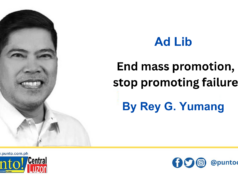Earthquakes happen anytime, anywhere. There was one earthquake that author Edmund Fuller couldn’t forget, which took place in China.
According to his story, when it occurred, a farmer was standing on a hilltop surrounded by his rice fields. Suddenly, he saw the ocean rush away from the shore like some large animal crouching for a leap. He knew that leap would be a devastating tidal wave.
The farmer saw his neighbors below working in their respective rice fields. Somehow, he knew that when the tidal wave would return, they would all be swept away by its force. Somehow, he had to call them to the safety of his hill. But they were far from where he was standing.
So, without thinking twice, he set fire to his straw stack and furiously rang the temple bell. His neighbors thought his farm was on fire and rushed up to the hill to help him.
They had hardly reached the top, when they heard and saw the swirling wall of water swish through the field they had just left. It was then that they realized how the farmer had saved their lives.
What the hilltop farmer had demonstrated was an act of magnanimity. The word is derived from the Latin roots magn which means “great” and anima, meaning “soul.”
The virtue of being great of mind and heart, magnanimity encompasses, usually, a refusal to be petty, a willingness to face danger, and actions for noble purposes. Its antithesis is pusillanimity. Both terms were coined by Aristotle, who called magnanimity “the crowning virtue.”
Edmund Spenser, in The Faerie Queen, had each knight allegorically represent a virtue. Prince Arthur, for instance, symbolizes “magnificience,” which is generally taken as a synonym of “magnanimity.”
Democritus states that “magnanimity consists in enduring tactlessness with mildness.” As an adjective, the concept is expressed as “magnanimous,” that is, “He is a magnanimous person.”
In his book, Ours Is The Faith, Walter D. Cavert shares the story of Peter Miller, pastor of a little Baptist church in Ephrata, Philadelphia, during the American Revolution.
Miller was well-liked by the people – except for one person who scorned all religion and opposed the church on every issue. No friend of the American Colonial cause, this man had been arrested for treason and sentenced to die.
What happened next was magnanimity in action. Writes Cavert: “The minister walked 60 miles to plead with George Washington for the man’s pardon. Regretfully, the general shook his head. ‘I’m sorry, but I cannot grant your request to spare your friend.’
Quietly, Miller replied, ‘My friend? He is my worst enemy.’ Amazed, Washington exclaimed: ‘What! You have walked all this distance to save an enemy? Then how can I do other than pardon him!’”
Magnanimity, contends British novelist C.P. Snow, is a “major virtue which at any level sweetens life, and at the highest glorifies it.” Harry Emerson points out, “No man ever saved anybody, or served any cause, or left any enduring impress, who was not willing to forget indignities, bear no grudges. The world’s saviors have all, in one way or another, loved their enemies and done them good.”
Indeed, the world is blessed most by men who do things, and not by those who merely talk about them. Such was the case of Johann Olav Koss, the star of the 1994 Winter Olympic Games at Killehammer, Norway.
A hometown favorite, he skated his way to three gold medals and three world records in the 1,500-, 5,000-, and 10,000-meter races.
Perhaps, no one was as surprised as Koss when he won his first medal. “There was so much joy over this gold medal that it made me think a little bit before the next race,” he was quoted as saying.
“I decided, if this will happen to me again, I want to give the bonus that I get to Olympic Aid… It made me strong, I think, to be skating for someone else.”
At a press conference after winning the second gold medal, Koss made his announcement: He would donate all his bonus money from equipment sponsors and the Norwegian Olympic Committee to Olympic Aid – a gift of more than US$175,000.
Koss challenged his countrymen to donate 10 kroner (US$1.37) for every Norwegian gold medal. The reaction caused an avalanche of funds, more than US$200,000 during the games and up to a million dollars afterward.
One form of magnanimity is the generosity of the victor to the defeated. Take the case of John D. Rockefeller, who was known for his amazing business success. He had also a greater reputation among those who knew him well as a man who was understanding.
He had a sincere appreciation for other people and was willing to accept failure if an honest attempt had been made at success.
When one of his partners, Edward T. Bedford, failed in a business venture, which cost Rockefeller’s company a million dollars, Rockefeller responded with a statement that has become classic in business lore.
He didn’t criticize Bedford because he knew he had done his best. He called Bedford to his office. “I think it is honorable that you were able to salvage 60 percent of the money you invested in the South American venture,” he told him.
“That’s not bad; in fact, it’s splendid. We don’t always do as well as that upstairs.”
That elevation or dignity of soul, which makes him delight in acts of benevolence, and prompts him to sacrifice personal ease and interest for the accomplishment of useful and noble objects. That is how Noah Webster’s 1828 Dictionary of the American Language defines magnanimity.
Oseola McCarty has spent most of her life helping people look nice – taking in bundles of dirty clothes, and washing and ironing them. She quit school in the sixth grade to go to work, never married, never had children, and never learned to drive because there was no place in particular she wanted to go. Her work was her life.
It was her way of being a blessing to others. At that time, many black people in rural Mississippi didn’t even have a job when she started working.
For most of her 87 years, Oseola spent almost no money. She lived in her old family home, and bound her ragged old Bible with Scotch tape to keep the book of Corinthians from falling out.
She saved her money, most of it coming in dollar bills and change, until she had amassed a little more than US$150,000. Then, she made what people in Hattiesburg are calling “The Gift.” She donated her entire savings – all of the US$150,000 – to black college students in Mississippi.
“I know it won’t be too many before I pass on,” she said, “so I planned to do this. I planned it myself.” She also said, “I wanted to share my wealth with the children.” Her main hope is to see a beneficiary of her gift graduate before she dies.
For comments, write me at henrytacio@gmail.com




